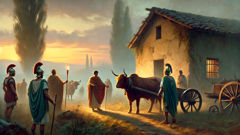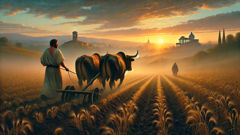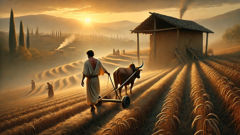Introduction
In the low, fertile sweep of the Roman countryside, where terraces of wheat rose and fell like the breath of the land, there stood a small farmhouse with a simple plow leaning against its wall. The fields there were worked by hands weathered by seasons—knuckles darkened by earth, nails thick with the memory of last autumn’s harvest—and by a man whose life had always been measured in cycles: seed, tending, harvest, and rest. His name, to those who knew him nearby, was Lucius Quinctius Cincinnatus. He was not a man of grand ambition or of conspicuous wealth; he kept neither a retinue nor a marble bust in the town square. Instead he rose each morning to the slow ritual of ploughing and sowing, finding satisfaction in honest labor and in the dependable companionship of his oxen.
Yet Rome that year sat uneasy. At the city’s heart, political tensions smoldered like embers in a hearth left unwatched. A virulent threat had forced the Roman Senate to seek urgent remedy: bands of enemy forces, skirmishing and gathering strength beyond the nearest hills, had encamped to challenge Rome’s borders. Panic moved through narrow lanes and across crowded forums as if carried by a gust. The Senate, desperate for order and speed, appointed a dictator: an extraordinary magistrate invested with absolute authority for a brief, necessary span. Into that sudden maw of power, they would call a man capable of swift action and unshakable resolve. It was then that envoys, robes flapping and sandals dusted with haste, found Cincinnatus at his plow.
They discovered him not among laureled halls but amid the soil, his tunic dusted with earth and his face lined from the sun. He listened, at first, using the patience he had learned from seasons; he accepted the olive-wood fasces, the symbols of his appointment, not with appetite for glory but with the gravity of duty. To the Roman people, Cincinnatus' acceptance would come to mark a standard for leadership: not a hunger for dominion, but a readiness to serve when the commonwealth demanded it. This legend—part history, part moral parable—reaches beyond its epoch. It is a story about what a leader can be when anchored to restraint, about how power is most durable when it is transient and accountable. And so the farmer left the field: he took his place at the head of the army, moved with astonishing speed, and, in a short season, delivered Rome from imminent peril—only to lay down his imperium when the emergency passed and return to the quiet rhythm of his plow.
From Plough to Purple
The day the envoys arrived, the sun was a low coin in the sky. Cincinnatus' hands were thick with the fine dust of turned soil; it lay in the crease of his palm and under his nails like a private map of his seasons. When the envoys told him of Rome's peril, their voices quick and practiced, he listened with a calm that set them off balance. Here was a man unaccustomed to rhetorical flourish, who answered questions with short sentences and who made decisions as he had always made them: deliberate, like the arc of a ploughshare through earth.

He accepted the office not as a consolation of vanity but as a response to need. The Roman constitution allowed for this extraordinary magistracy precisely for moments that demanded concentrated authority and swift, disciplined action. Contemporaries would later recount how, for Cincinnatus, assuming such power felt less like a coronation and more like putting on a cloak heavy with responsibility. He asked for no pomps; he sought not to bask in triumph but to extinguish threat. Citizens watched him leave his fields and enter a world of logs and ledgers, of councils and battle lines—an unfamiliar terrain for a man who had measured his life by seed depth and furrow width.
From the vantage of the field, decisions about legions and alliances must have seemed abstract—yet Cincinnatus translated abstraction into action with a directness born of practical certainty. He was a commander who distrusted rhetoric that did not translate into movement; he ordered troops with an economy of words and a clarity of purpose. The invading forces, many accounts say, were a combination of disaffected neighbors and opportunistic marauders. Their generals had the advantage of surprise and numbers to boast of campfires that dotted the horizon like mocking beacons. Cincinnatus moved as if guided by the seasons' logic: preparation, timing, execution. He assembled his men, not from soldiers who had trained for years, but from citizens who answered the call because Rome asked it of them. He drilled them, shaped them into a single organism of intent, and advanced with a momentum that surprised both friend and foe.
There are two elements to this campaign that history and legend emphasize: speed and restraint. Cincinnatus refused to linger in ceremonies. He refused to allow his soldiers to be tempted by plunder that would mar their discipline and cloud their sense of purpose. He preferred a swift, surgical strike rather than a prolonged, glory-seeking war. When the enemy attempted to draw Rome into a pitched battle where numbers might overwhelm, Cincinnatus used terrain and timing, withdrawing when necessary and striking when the advantage tipped. His actions were marked by a humility of strategy: he was not interested in conquering for conquest's sake but in ending the threat decisively and returning Rome to normalcy.
The stories say he trapped the enemy against a river, blocked escape routes, and forced a surrender. Others speak of a night march and the quiet sealing of camps. Whether by cunning maneuvers or by sheer morale and cohesion of his men, Cincinnatus achieved what was required. He completed the task with an efficiency that bordered on the surgical. When the dust settled, banners of triumph were not his immediate desire. Instead, he sought a swift handover: once the senators were satisfied the danger had passed and Rome's safety restored, he relinquished the extraordinary imperium without negotiation.
This renunciation was no simple formalism. To stand down, to return his fasces and lay aside the trappings of singular authority, required a different courage than that of battle. Power has a gravity. It shapes habits, inflates appetites, and narrows the distances between self and reverence. Yet Cincinnatus stepped away. He walked from the forum not as a diminished man, but as one who had borne what was necessary and, when duty ended, had relinquished what was not his to hold. On the way back to his farm, people stopped him in the streets, not merely to praise but to ask what it meant that a man could accept such power and then, without ceremony, return to a ploughshaft. The answer revealed itself in the steadiness of a man who preferred the honest tick of seasons to the fickle applause of the crowd. He seemed to say, by example, that the measure of leadership lay in service rendered and then surrendered.
The event rippled outward. For Romans, and for later generations who would tell and retell the tale, Cincinnatus became an emblem. His story offered a counterpoint to those who clung to power: a model where authority is a temporary tool, not a permanent pedestal. Ancient writers used the narrative to instruct young statesmen and to remind magistrates that the commonwealth outranks personal ambition. The farmer's return to the plough was the final tableau of this act: the scene of a man stepping back into anonymous labor with no demand for recognition. It is easy to romanticize the image, to imagine a cinematic close-up of soil crumbling between fingers, but the truth of it lies in the moral chord it struck. For a city built on laws, institutions, and the expectation that leaders would sometimes be called to extraordinary roles, his restraint was a lesson that echoed through assemblies and private conversations alike.
Beyond Rome, the idea lodged in the imagination of republics and commonwealths: what if the essence of leadership were to serve and then to yield? What if the highest compliment a leader could receive were not monuments but the freedom to return to ordinary life? Cincinnatus' example was never meant to be an abstract virtue only; it was anchored in action. His short tenure of power demonstrated that a government could, in extremis, concentrate authority and yet emerge intact because that authority was relinquished once the emergency passed. It provided a practical blueprint: emergency powers must be bound by temporality; they must serve ends that do not dissolve the polity in the process. In that way, the farmer who became dictator left behind more than a military victory; he left behind a way of thinking about the relationship between rulers and the ruled, between honor and humility.
What remains most instructive about this part of the story is the temperament Cincinnatus displayed. He combined decisiveness with an ethic of proportion. He understood that the moral hazard of power is not merely that leaders will oppress, but that they will grow accustomed to the comfort of command. He therefore modeled an alternative habit: the leader as servant, who can set aside public office with the same ease with which he picked it up when it was needed. The image of that man, dusty from labor, placing his hands once more on a plough, taught Rome that greatness could be displayed not only in triumphant banners or in monuments carved from marble, but in returning to the ordinary human tasks that sustain life.
In time, the legend of Cincinnatus took on symbolic layers. He was invoked in speeches and inscribed in treatises. Roman children learned the tale not as mere entertainment but as an ethic. Later societies echoed his name when they sought to hold power to account. For those who study leadership today, the story remains more than an anecdote; it's a testing ground for how to align authority with accountability. When power is accepted reluctantly and relinquished willingly, it retains moral authority. That truth, enacted by a farmer who once tilled the earth, hypertrophied into a principle that outlasted the plough itself.
Still, it would be mistake to treat the tale as one dimensional. Cincinnatus' virtues did not make him a perfect man; he was of his time, subject to the biases and limitations of his era. Yet the story's endurance suggests that societies constantly need models that show power as a tool rather than a prize. The Roman farmer's journey from plough to purple and back again forms an instructive arc: it is a lesson in the practicalities of governance, in the moral limits of ambition, and in the quiet dignity of returning to one's roots after a task has been completed.
The Return to the Fields
Victory, when it arrives through discipline rather than spectacle, often resolves into an unglamorous catalog of tasks: tending prisoners, securing supply lines, negotiating the terms of surrender. For Cincinnatus, though, these chores were provisional. He saw himself as a custodian of the republic's safety, not as a founder of a new dynasty. The moment the Senate signaled that Rome was secure was the moment he gave back the temporary authority they had entrusted to him. It was a gesture both simple and radical. He walked into the forum, placed his staff of office back into the hands of the magistrates, and returned to his plow. The image is arresting: a man allowing the machinery of power to click back into civilian hands, an ordinary operand retaking its place in the machinery of daily life.

This act of relinquishment is worth examining line by line. First, the symbolic exchange: the fasces, the rods and axe that represented the coercive capacity of the state, rested temporarily with a man of humble origin. When he returned them, he signalled that coercion, once necessary, would be curtailed. Second, the procedural closure: he did not cling to authority on the pretext of lingering dangers; he trusted the institutions and the senators to maintain civic order. Third, the personal cost and gain: stepping back from command exposed him to the ordinary vulnerabilities of a private citizen—no longer defended by bodyguards, no longer entitled to extraordinary legal immunities—but it also restored his identity as a member of the ploughing community. The choice to accept and to relinquish authority reveals a moral architecture: leadership is legitimated by its readiness to end.
In the centuries that followed, historians and philosophers returned to that denouement as illustrative of balanced governance. Cincinnatus had demonstrated a principle often lost in the fog of power: that legitimacy is not only won on the battlefield but preserved by restraint. Where rulers cling, the social fabric frays; where they yield, the social order rejuvenates. His return to the fields was therefore not an abdication but a reaffirmation of civic priorities. It said, plainly, that Rome was not the creature of its leaders alone but of laws, habits, and a collective dedication to the common good.
There is also an ethical lineage to be traced here. The moral of the tale converges with ideas from other cultures and later ages: leaders who use power sparingly are those whose authority is most enduring. In an age where political ambitions could easily become hereditary or autocratic, Cincinnatus offered an alternative script: the leader who serves as a temporary steward. The story was not only a parable for rulers; it was a teaching tool for citizens. It encouraged an ethic where citizens could accept responsibility, without video of it turning into a lifelong hunger for more. That ethic, though born of a city-state's needs, has an evergreen applicability.
The human details around his return matter. When Cincinnatus walked the lanes back to his farm, villagers came to greet him, not with the fevered adulation reserved for the triumphant, but with a mixture of gratitude and quiet astonishment. Children asked questions about banners and camps, elders inquired about the dignity of discipline, and peers observed how he balanced a battle-scarred hand with the gentle touch required by a plough. These small moments anchored the grander narrative in the tactile reality of human community. It is one thing to win a war; it is another to re-weave the social fabric afterward. Cincinnatus' presence in the market and the fields after his office affirmed that victory need not isolate a man from the world he served.
Legacies are seldom simple. Cincinnatus’ story became a standard, but it also acquired mythic accretions. Generations of Roman orators invoked his example when they wished to shame colleagues into moderation. Later, states and leaders in other centuries pointed to his renunciation when they wanted to praise republican virtues. The American founders, for instance, referenced his name when framing debates about temporary emergency powers and the avoidance of permanent dictatorships. It’s an apt illustration of how an ancient anecdote can migrate across time and language to inform modern constitutional thinking. The core lesson remained constant: guard the commonwealth from external threats, but guard it also from the temptation of internal consolidation of power.
Yet the resonance of Cincinnatus is not solely political; it is philosophical and pastoral. There is an idea of dignity in manual labor that the tale foregrounds: a life of honest, often anonymous, toil is not demeaning but ennobling. To lay aside laurels in favor of ploughing is to assert a value that places sustenance and community above spectacle. In an era where status was frequently affirmed by monuments and inscriptions, the farmer's contentment with a small household and the rhythm of seasons offered a counter-narrative. This is not to romanticize poverty or to suggest that the world needs fewer great leaders; rather, it is to highlight that greatness may take forms that are quiet and embodied rather than announced and ostentatious.
The return to the fields also became a recurring motif in art and literature. Painters rendered the moment in tempera and oil: the stooped figure of a man framed by plough and ox; sculptors carved the scene into marble with gravity, showing the exchange of fasces as part of a civic ritual. Poets praised the simplicity of a man who could accept the highest office and then step away without rancor. These artistic reflections helped to cement his image across centuries, converting a local legend into a widely recognized archetype.
Ultimately, when readers of any era consider Cincinnatus, they confront a standard of leadership that is as relevant now as it was then. In contemporary debates about term limits, emergency powers, and civic accountability, his actions provide a moral touchstone. The farmer who became dictator and returned to his plough challenges modern leaders to consider the temporality of power and the dignity of modesty. He invites citizens to expect more than spectacle from their rulers: they may demand service, then insist on its surrender.
The story ends where it began: in the slow hush of a field at dusk, the plough furrowed by a hand that had once commanded an army. That image—so simple, so stubborn—reminds us that courage is not only the measure of how one fights but of how one yields. It affirms, across ages, the possibility that leadership and humility need not be enemies, but can be companions on the same road.
And as the seasons turned again, the ploughmarks in the soil faded and were replaced by new seed; Rome carried on, governed by laws and by the memory of a man who taught, by example, that the most enduring authority is the one that is used sparingly and returned willingly.
Conclusion
The legend of Cincinnatus endures because it condenses an ethical truth into one arresting image: a man who answers a desperate call to lead and who, having fulfilled his obligation, sets aside power to return to ordinary life. In that single arc—acceptance, decisive action, renunciation—lies a lesson about leadership that modern societies still need. Emergency authority, when granted, must be used to protect civic life and then relinquished to preserve it. Power that clings corrodes institutions; power that yields renews them. Cincinnatus embodies a model where authority is not a trophy but a temporary instrument used in service of a collective good. Beyond politics, his story speaks to a broader human aspiration: to be useful, to act with restraint, and to value the quiet dignity of everyday labor. When historians, students, or citizens revisit his tale, they find not only a stirring account of a swift military rescue but a parable about the moral architecture of leadership. And in a small farmhouse, beneath the unassuming whisper of wheat and the cyclical certainty of seed and harvest, one can still imagine a plough leaning against a wall—a mute admonition that greatness often looks like simple work performed and then laid down, without ceremony, when the task is done.













